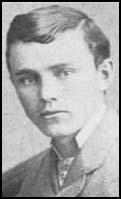Robert Ford

Robert Ford was born in Richmond, Missouri, in 1861. Robert and his brother Charlie became outlaws and eventually joined the Jessie James gang.
On 8th October, 1879, the gang held up the Chicago & Alton Railroad at Glendale, Missouri and stole $6,000. This was followed by other raids, in one, at Blue Cut, Missouri, in September, 1881, the gang killed the conductor and a pensioner. The governor of Missouri, Thomas Crittenden, now responded by offering a reward of $10,000 for the capture of Jessie James.
Ford contacted Governor Crittenden and offered his services in order to gain this reward. On 3rd April, 1882, Ford visited Jessie James in his home and when he stood on a chair to straighten a picture on the wall, he shot him in the back of the head. Ford was found guilty of murder and sentenced to death. Two hours later he was pardoned by Crittenden and given his reward.
It was claimed that friends of Jessie James were determined to kill Ford so he went into hiding. He remain free until he was assassinated on 8th June, 1892.
Primary Sources
(1) Robert Ford described to Governor Thomas Crittenden how he had killed Jessie James (April, 1882)
On the morning of April 3, Jess and I went downtown, as usual, before breakfast, for the papers. We got to the house about eight o'clock and sat down in the front room. Jess was sitting with his back to me, reading the St. Louis Republican. I picked up the Times, and the first thing I saw in big headlines was the story about Dick Liddil's surrender. Just then Mrs. James came in and said breakfast was ready. Beside me was a chair with a shawl on it, and as quick as a flash I lifted it and shoved the paper under. Jess couldn't have seen me, but he got up, walked over to the chair, picked up the shawl and threw it on the bed, and taking the paper, went out to the kitchen. I felt that the jig was up, but I followed and sat down at the table opposite Jess.
Mrs. James poured out the coffee and then sat down at one end of the table. Jesse spread the paper on the table in front of him and began to look over the headlines. All at once Jess said: "Hello, here. The surrender of Dick Liddil." And he looked across at me with a glare in his eyes.
"Young man, I thought you told me you didn't know that Dick Liddil had surrendered," he said.
I told him I didn't know it.
"'Well," he said, "it's very strange. He surrendered three weeks ago and you was right there in the neighborhood. It looks fishy."
He continued to glare at me, and I got up and went into the front room. In a minute I heard Jess push his chair back and walk to the door. He came in smiling, and said pleasantly: "Well, Bob, it's all right, anyway."
Instantly his real purpose flashed upon my mind. I knew I had not fooled him. He was too sharp for that. He knew at that moment as well as I did that I was there to betray him. But he was not going to kill me in the presence of his wife and children. He walked over to the bed, and deliberately unbuckled his belt, with four revolvers in it, and threw it on the bed. It was the first time in my life I had seen him without that belt on, and I knew that he threw it off to further quiet any suspicions I might have.
He seemed to want to busy himself with something to make an impression on my mind that he had forgotten the incident at the breakfast table, and said: "That picture is awful dusty." There wasn't a speck of dust that I could see on the picture, but he stood a chair beneath it and then got upon it and began to dust the picture on the wall.
As he stood there, unarmed, with his back to me, it came to me suddenly, 'Now or never is your chance. If you don't
get him now he'll get you tonight.' Without further thought or a moment's delay I pulled my revolver and leveled it as I sat. He heard the hammer click as I cocked it with my thumb and started to turn as I pulled the trigger. The ball struck him just behind the ear and he fell like a log, dead.
